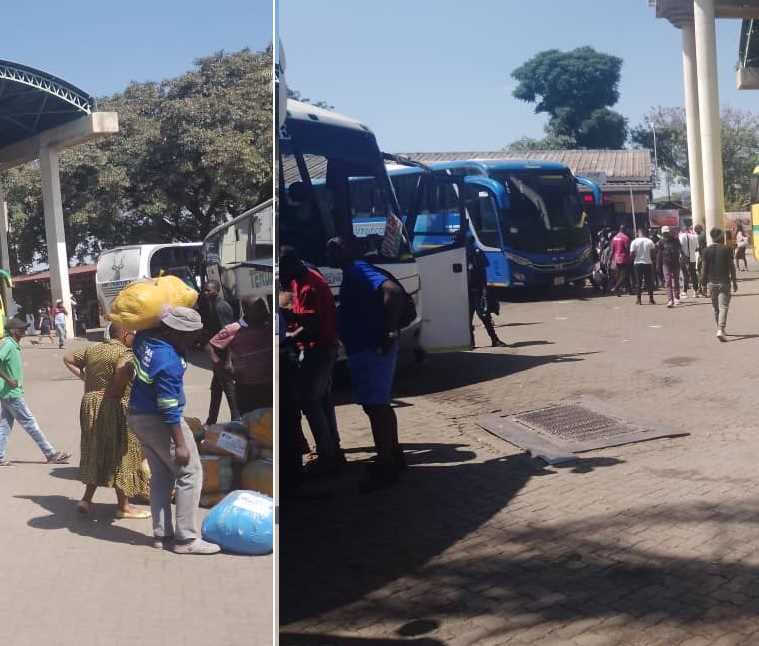Edmore Zvinonzwa
“Mukoma muri kuda kuenda riini and muri vangani. (When do you want to travel my brother and how many are you? I am personally travelling on Sunday,” said Mark (not his real name),
“Mari yenyu chete mukoma. (Just bring your money).”
That’s how easy it is to travel to South Africa and smuggle out goods as this writer found out at Roadport recently.
An estimate from a Roadport worker puts the average number of buses leaving for South Africa at 30 daily, thus over 1 000 passengers. High Glen is another exit point in Harare for those destined for SA. Other places like Mutare, Gweru and Bualwayo also have exit points for the SA route.
https://zimbabwenow.co.zw/articles/1346/police-bust-smugglers-along-chirundu-highway

Mark is employed on the crew of XXX – a company that operates cross border buses that mostly ply the route between Harare and Johannesburg,
Further inquiries revealed that the bus charges R800 for a single trip to Johannesburg.
On hearing that there were two of us intending to travel without documentation, Mark volunteered his mobile number, adding that the fare would jump up to R2 500 per person. The difference is to bride
“Kana mabhadhara iyoyo mari, you don’t even leave the bus. You leave everything to us imi makagara zvenyu paseat renyu. Ndobasa remari iyoyo yamunenge mabhadhara imi hamutauri nemupurisa even wekuSA side. (For that amount, you can enjoy the ride with no hassle. Your money will work for you while you sit. We deal with the police on this side and the SA side,” Mark said.
To ensure that one’s luggage goes across without being subjected to searches, an extra amount will do the trick, Mark revealed.
“Sunday the bus leaves at 1230pm so you must call me so that we organise issue yeluggage. Crew members’ stuff is not subjected to searches and if the parcel is small tinokanda ipapa (we place it with our own kuggage). Imi chenyu (you just pay) is R1 200 more.”
Mark indicated that while the crew is happy to facilitate the smuggling of humans and small items, drugs, notably dagga, are bit tricky. However, he implied that with enough money, nothing is impossible.
“We may want to contact our team at the border post if your luggage is that sensitive. Let’s hope haisi mbanje (Hopefully, it’s not dagga, these days there are sniffer dogs. Mbanje hadziite, dzinopisa wangu. And imbwa dzacho hadziite manje dziya dzinobata the dogs are very efficient and can pick) even the smallest unit of dagga.
While he bragged that his company are the acknowledged masters of the game, Mark told this writer that almost all buses plying the route are complicit in the illegal movement of goods and humans into neighbouring South Africa and beyond.
“These other buses will charge you the same if not even more but unfortunately, they will not help you cross. They will take your money and on reaching the order post, they will ask you to drop off and find your way across so that you meet up with them on the South African side.”
Related Stories
He said corrupt border post staffers and security forces on both sides of the border have formed a criminal network because they are all benefitting from the bribe and protection fees paid by bus crews and haulage truck drivers.
He said officials from Zimbabwe Revenue Authority and the Department of Immigration as well as security forces are all involved in the smuggling deals.
*Kule*, a crew member with a different bus company said that buses mostly carry undocumented passengers out and do not smuggle too many goods.
“Kuma trucks ndiko kune nyaya wangu. Haa vanobudisa zvese zvaunofunga. XXX company dzinofamba dziri convoy dziye dzinotozivikanwa kuti all the way from DRC to SA, ndivo vanhu vemadhiri acho. Minerals, diamonds, chero chaunoda vanogadzirisa. (XXX brad haulage trucks that move in convoys are known as the worst smugglers from DRC to SA. They ferry everything including diamonds and minerals),” Kule said.
He said haulage trucks also carry drugs as they have spaces where they can hide the stuff even from the sniffer dogs.
Kule said haulage trucks at times drop off both goods and passengers at points in Beitbridge. The people and goods then find their way across through the many illegal entry points to a rendezvous with the transporter on the other side.
In February this year, six foreigners, believed to be Zimbabweans, appeared before the Marble Magistrates’ Court near following their arrest after being caught loading smuggled cigarettes worth R6 million from a gas tanker into two cargo trucks in the Limpopo Province.
https://zimbabwenow.co.zw/articles/2405/smugglers-use-gas-tanker-used-to-sneak-cigarettes-into-sa
A Harare man was last year caught smuggling aircraft spares. In August of the same year, a joint operation involving SA border control guards and Zimbabwean security officials destroyed a bridge made of logs, metal poles and sand bags along the Limpopo River. The bridge was used as an illegal crossing point by smugglers.
About 11 floating boats from various smuggling points were seized by border security staff in July, 2022.
Zimbabwe is seen as country with open borders and people from countries like Somalia, Eritrea, Malawi and Ethiopia pass through the country before entering SA illegally.
There are about 548 undocumented Malawians in Zimbabwean jails following their arrest en route to SA. They were apprehended by the police over illegal entry and failure to produce a valid passport. 317 are held in Harare, 83 in Whawha, 82 in Chivhu and 66 in Mvuma.
Police in Zimbabwe and South Africa have declared war on the smugglers with several arrests effected over the past two years.
But Mark and Kule's willingness to disclose their smuggling activity openly to a total stranger show that the impact of the clampdown is still very limited.
Support investigation: Philemon Jambaya
Support Research: Monica Cheru
Editing: Monica Cheru
This is a Zim Now team article was produced after an investigation with support from the Voluntary Media Council of Zimbabwe (VMCZ) Investigative Journalism fund on transnational crimes


















Leave Comments